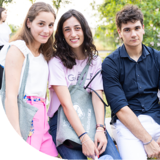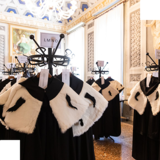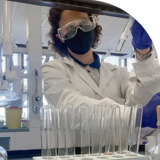Start with yourself
Why is it important to choose primarily keeping your aspirations and desires in mind?
Start with yourself, and don't leave the choice to the advice of others or to the fashion of the moment.
Gather the information you need and learn how to order it in time.
Focus on your desires and their feasibility without worrying too much about secondary elements, such as proximity to the location or the search for secure employment.
If you still have any doubts or curiosity, please contact us through this form
Look around you
The world of work is increasingly complex and nuanced, so it is impossible to predict developments, especially for periods of time equal to an undergraduate or even a graduate degree programme.
What does "looking around" mean?
Getting to know the world of education
Find out which study programmes are right for you, meet the institutes and universities that offer them and find out more about what is on offer.
Visit the websites dedicated to orientation and postgraduate training, in Italy and abroad
Visit the websites of individual universities or the websites dedicated to university studies and students.
Experiment, try out, participate, take advantage of the orientation opportunities offered by the university: open days, open classes, workshops, websites ...
Getting to know the world of work
Gather information about the (geographical, productive, etc.) context in which you are placed, learn more about the characteristics of the professions that attract you and the training paths to achieve them.
- www.cittadeimestieri.it (information on orientation, training and employment)
- www.quadrodeititoli.it (CIMEA website, overview of all regulated Italian professions and related professional qualifications - abilitations -)
- www.ifl.servizirl.it/site (regional framework of professional standards, Lombardy Region)
Be careful, it is important to understand the context in which certain professional opportunities are most likely to develop!
Understanding what the labour market is looking for
Which competences can be more useful to be competitive in the professions of interest?
Consider the university as an opportunity
Choosing a university path means...
- acquiring theoretical and practical skills in different subject areas
- developing analytical and in-depth study skills
- learning to 'learn', i.e. to manage information
University is different from school because...
- you chose it and you can study what you like
- lessons are interactive and you will be asked to be more involved in the classroom and in individual study
- you will have to manage your time better by alternating MONTHS of class attendance and MONTHS of exams
Not only lessons... Choosing a university is not just about attending lectures and taking exams. Take advantage of the facilities and services to build your path:
- language services
- company internships and meetings with the world of professions
- study and work abroad
Advice and guidance initiatives
The initiatives organised by our university Advice and Guidance unit are dedicated to students, parents and teachers. They offer the possibility to plan an orientation path that starts in high school and continues after enrolment through the help offered by university group tutors. The events and initiatives are conceived as useful steps to gather information about the university educational offer, to test teaching methodologies directly on the campuses and to learn about the opportunities offered by the labour market with the aim of responding to its requests according to your desires and skills.
The orientation initiatives, very different from each other in terms of target audience and time, are divided into OFF CAMPUS, IN CAMPUS (if they are held, respectively, outside or inside the premises) and activities aimed at strengthening the NETWORK with SCHOOLS. OFF CAMPUS activities mainly include participation in fairs and orientation fairs, while presentations in schools, school fairs, psycho-aptitude meetings, orientation meetings for parents, Progetto Collegiali(College Project) activities and PCTO - Pathways for transversal skills and orientation - are initiatives both inside and outside the campus with the aim not only to help students get oriented but also to establish, maintain and strengthen the relationship with schools. IN CAMPUS activities, on the other hand, include: activities where you can experiment university teaching methodology such as Proval’Università (‘Try out the University’), the Business Game, Parti in IV (‘Start off well’), A lezione di (‘Classes of’), workshops and laboratories, the New students’ Area and individual interviews that are conducted daily in the office, the Summer Experience - residential and non-residential -, simulations of admission tests and the Open Day in its various forms.
Types of degrees
Undergraduate degree programmes
These are the majority of the degree programmes.
They last 3 years and they are also known as the first level degree programmes: at the end of these programmes, the title of ‘dottore’ (doctor) is obtained.
Once you have obtained your undergraduate degree, you can continue with a graduate degree.
Integrated degree programmes
They are degree programmes that train professionals in specific fields, regulated by European standards.
They last 5 or 6 years and they are also known as second level programmes: at the end of these programmes, the title of ‘Dottore magistrale’ (Master’s Doctor)is obtained.
University Glossary
Courses
Each programme is made up of a part of lectures, at the end of which an exam is taken, and awards the same number of ECTS and a grade (expressed in a mark out of 30) which varies according to the level of preparation.
Credits (ECTS)
They measure the amount of learning work required. Each examination is associated with a number of ECTS, which estimates the amount of work involved; 1ECTS is equal to 25 hours of work, personal study or laboratory attendance.
Degree class
They are groupings of university programmes of equal level that share certain educational objectives and award degrees with identical legal value. All degrees belonging to a class have the same legal value.
Exams
Annual: between 8 and 12 credits (ECTS). Classes last from October to May and the exam can be taken in the summer session (from June).
Semester: courses with a number of hours and period of lectures equivalent to half of the annual course
Final examination or dissertation
A written project or research paper, usually on a subject related to a course in the study plan, carried out under the guidance of a professor/lecturer (supervisor). In order to obtain the degree, the paper is discussed in front of a commission.
Integrated degree programme
These are degree programmes lasting 5 years (Law and Primary Education) or 6 years (Medicine and Surgery, Dentistry and Dental Prosthetics). At the end of the programme, students are awarded the title of ‘Dottore Magistrale’ (Master’s Doctor).
Internships and apprenticeships
Some degree programmes include a compulsory internship or apprenticeship with organisations or companies during the final year. It is possible to do internships in Italy and abroad outside the study plan.
Lessons
They take place from September/October to May. They may be free or compulsory and end with an exam.
Registration
When you register to the first year of university, you receive an ID student number, which is needed to register for exams and use the University's services. “Freshman” is a frequently used term to indicate a first-year student.
Study plan
This is the set of courses, divided up for each year of the programme, which the student must attend, taking the relevant examinations, in order to obtain a degree.
Workshops and seminars
These are supplementary activities based on the active involvement of the student, in which topics covered during the lessons are explored in depth.





